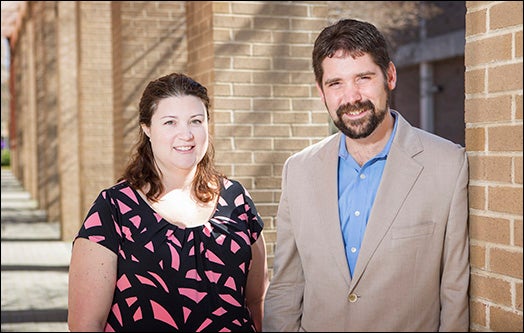A ‘MODEL’ PROGRAM
Grant allows undergrads to explore biomedical engineering at ECU
“Biomedical Engineering in Simulation, Imaging and Modeling” begins in May and will host students on campus at ECU for 10 weeks. Zac Domire of the Department of Kinesiology and Stephanie George of the Department of Engineering designed the program.
Only eight students will be selected and each will receive a generous stipend and money for room and board. The program focuses on the use of models – a simplification of reality – for biomedical engineering research and examines how imaging can improve modeling.
Each student will be matched with a faculty mentor to work on an individualized research topic. Those will vary from creating models of the circulatory system or muscles to measuring force on the knee joint or bones in the lower leg during running.
Other participating faculty mentors are Barbara Muller-Borer, William Howard, Paul DeVita, Stacey Meardon, Tarek Abdel-Salam and Jason Yao.

Stephanie George, left, ECU Department of Engineering, and Zac Domire, ECU Department of Kinesiology, designed the summer program that will draw undergraduate researchers to ECU.
The grant is aimed at attracting individuals interested in science, but also seeks to attract a diverse pool of applicants. To ensure that result, Domire said they partnered with three historically black universities and a fourth institution with a very diverse student body: N.C. Central University, Elizabeth City State University, Fayetteville State University and University of North Carolina at Pembroke.
Research Experiences for Undergraduates grants are generally aimed at increasing awareness of and application to graduate school.
“We want people to get exposed to science and engineering and then choose careers in science and engineering,” Domire said. “(The program) should really help the students get a much more in-depth knowledge of the material.” “If undergrads have research experience,” George added, “they’re more likely to continue on that degree path. This gives them an idea what (graduate school) might be like. It should make them feel they’re capable of doing it.”
This is the second REU program to be hosted at ECU. The first was awarded to Junhua Ding in computer science, which began summer 2013. Both REUs are three-year grants. Organizers plan to coordinate various social events between the groups of students.
“These two awards allow undergraduate students in computer science and engineering the opportunity to experience cutting-edge research work with a faculty mentor,” said David White, dean of the College of Engineering and Technology. “They often come away from the REU experience with a desire to pursue a graduate degree and a career as a research scientist.”
###
Margaret Turner of the ECU College of Engineering and Technology contributed to this report.